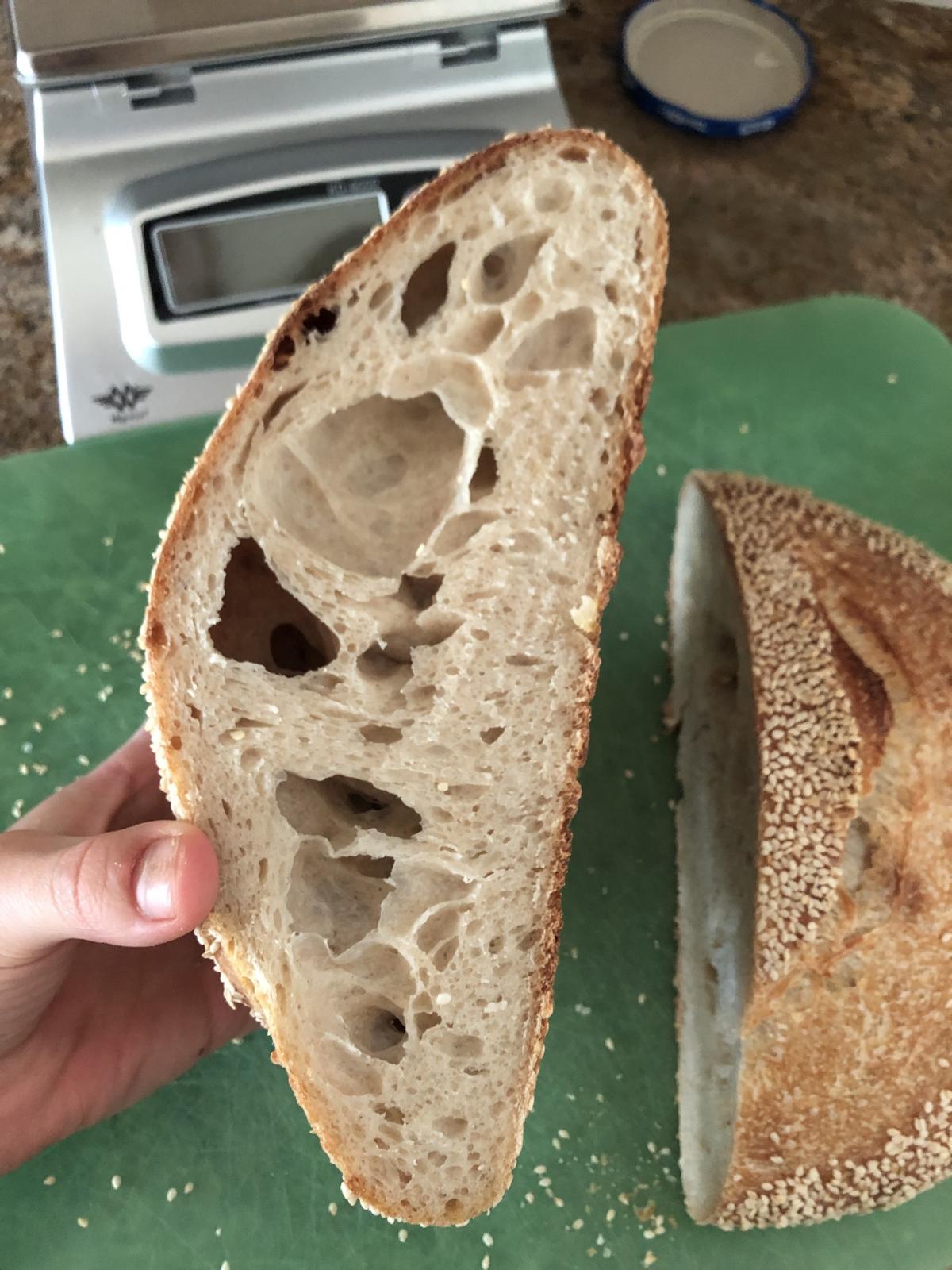July 11, 2019 - 3:36pm

Holey top, dense bottom (overproofing?)

Hello! I'm relatively new to sourdough (this is my 10th loaf) and am still trying to understand the signs of a well-proofed loaf. One of my difficulties is that my starter is pretty slow (it takes about 8 hours to reach its peak) so I can't normally go off times listed in recipes. Anyway, I baked this loaf today and as you can see, the top of it is very holey while the bottom of the loaf is much more dense.
In my efforts to get a more sour flavor, I retarded the (65% hydration) dough in the fridge for 24 hours, then proofed at room temperature about 11 hours. The dough was also fairly "delicate" in that it wasn't holding its shape very well. Could the overproofing have been the problem with this loaf?
Thanks for all your help!


Welcome to sourdough! From the picture it looks like a classic case of being under bulk fermented. The typical signs of this are large pockets of air with tight, dense crumb in between. Did you allow any bulk fermentation before you put the dough in the fridge?
Thank you! I allowed for some, but maybe not enough, bulk fermentation before retarding it. Over the course of about 2.5 hours I have it 3 stretch and folds before placing it in the fridge.
I think you need to focus on your starter. I say this because your bread fermented a very long time and the crumb indicates under proofing.
It is a common practice to ferment the dough at room temperature (or warmer) before retarding in the refrigerator. This allows the yeast and bacteria a chance to become activated before retarding.
Please tell us everything you can about your starter. Pictures may be helpful.
Danny
My starter has always been very slow to rise, but it is only about 2 months old and has produced some very nice loaves in the past. This was a loaf which I made about a week ago, with no bulk ferment in the fridge but rather about 10 hours at room temperature. I then proofed the below loaf for about 7 hours before placing it in the oven.
sourdough cross section.jpg
starter reference.jpeg
This is my 100% hydration starter- I recently started feeding it with whole wheat flour instead of all purpose so that is what is pictured. However, when I made the problem loaf I was still feeding with all purpose. With the whole wheat, I notice that it rises higher and is quite a bit thicker, while the all purpose flour yielded a very liquid and somewhat low-rising starter.
I am very confused as to why my starter takes so long to rise (about 8 hours before it reaches its peak) but is it possible that it just needs more time to develop (aka it's too young, and maybe in a couple months it will be fully mature and rise quicker?)
Thank you for all your help!
Amelia, tell us about your starter.
What water are you using? Is it highly chlorinated?
Please reply with the formula (recipe) you used. How much flour, water, salt, and levain? What was the hydration of the levain used?
Suggestion - have you dehydrated some of your starter as a backup? I highly recommend doing so, just in case something goes wrong with your starter. It’s rough losing all of that hard work...
Dan
It doesn't seem like there's any issue with the starter. They said they had a good loaf with 10 hours at room temperature and this one only got 2.5 hours at room temperature so of course it's underproofed. Plus this has the look of classic underproofing, it just needs a longer bulk ferment.
-- I know this thread is old, but it came up in my googling something else so I thought it might be worth following up on.
I see nice bubbles under the big ones, not really dense. Not underproofed or overproofed. What I do see is a loaf that could have used a reshape and big bubble popping when it slouched to tighten up the gluten matrix and give it back its form. When you see a free form loaf spreading more out and up, try a simple folding to pop big gas bubbles and strengthen the overall shape. Can also be that just a little bit too much water is in the formula and might be easier to handle with a tiny bit less.
Peaking starter sounds normal enough. More details may help us direct your starter feeds for your personal use. Don't forget to include temps and a rough location of where you are. Location and season can affect the starter. With a starter that takes time to increase yeast slowly, I usually mix and knead the dough, then rest the dough for several hours before starting to fold. Start folding when volume has started to increase and rise about one third of the original volume for a regular wheat loaf.